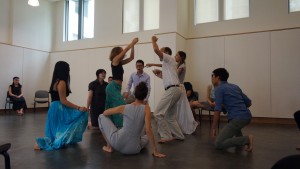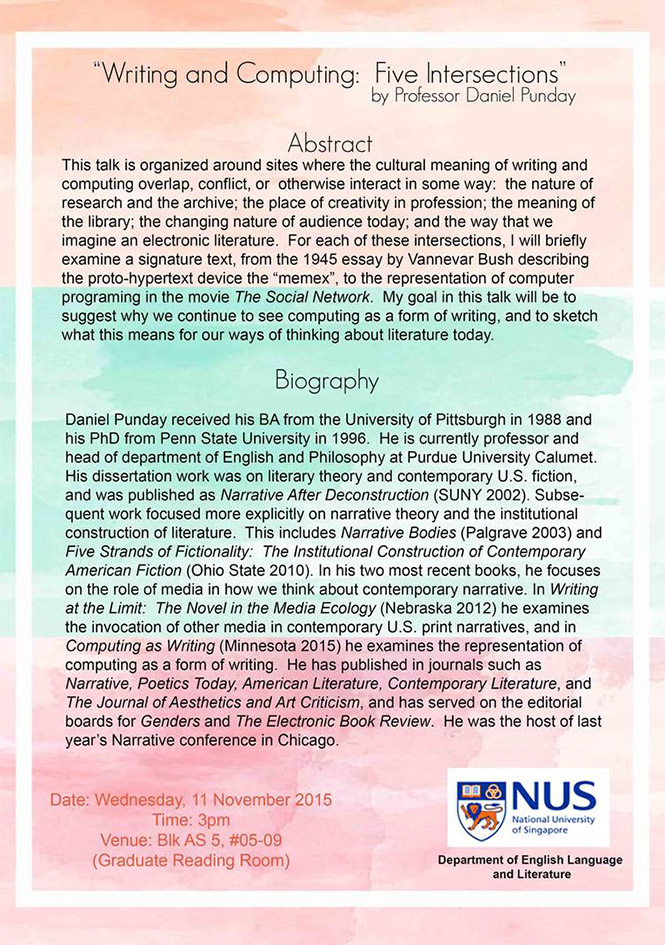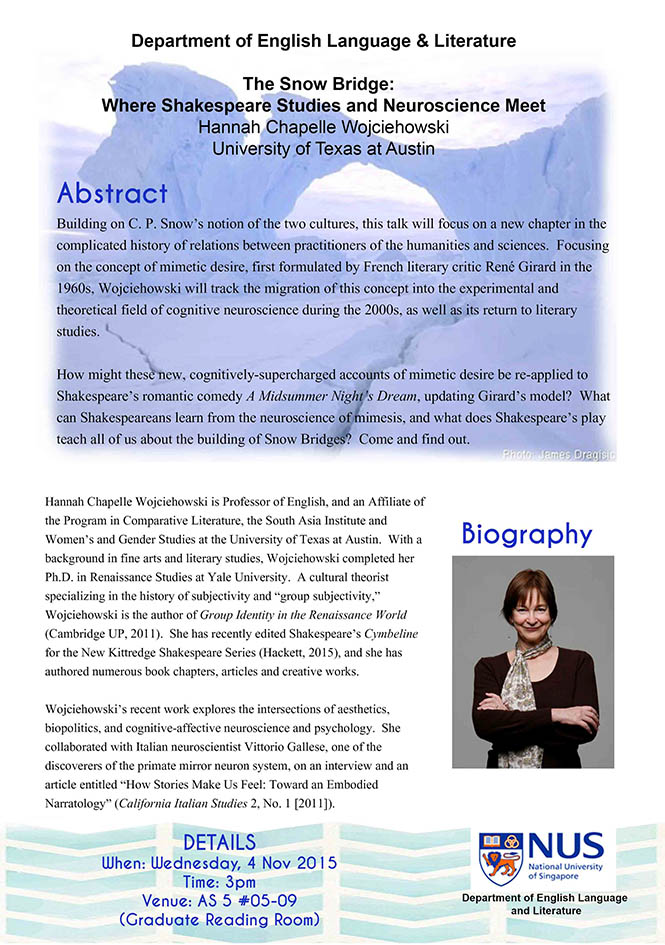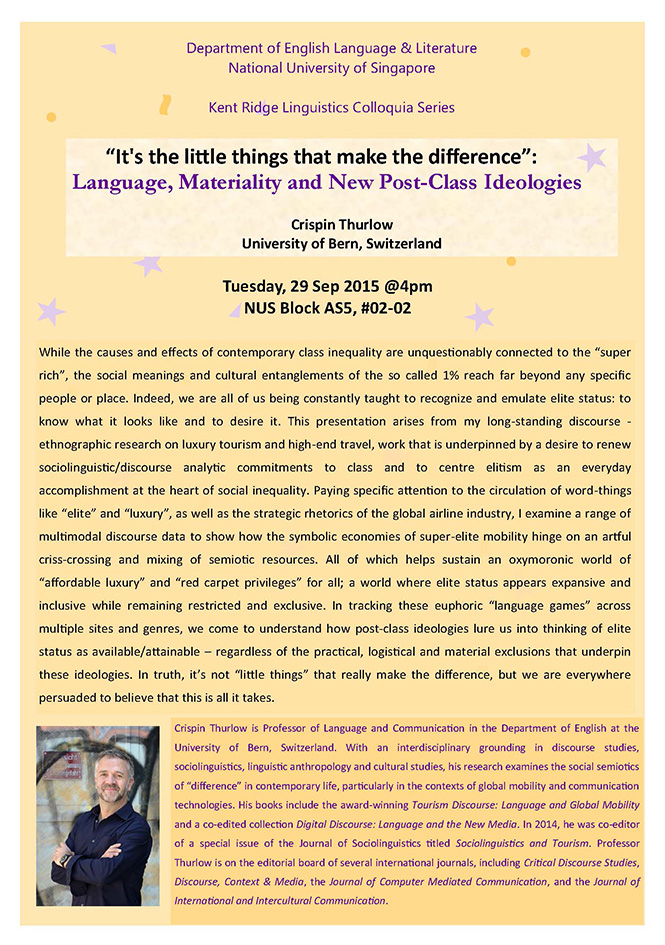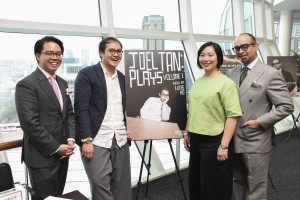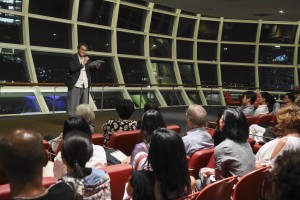This year, seven faculty members of the department won the Faculty Teaching Excellence Award for their teaching done in 2014/2015. Below we invite two of the winners–Dr Graham Wolfe and A/P Mie Hiramoto–to share their thoughts on teaching and education.
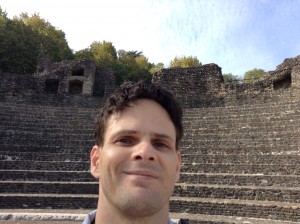
Interview with Dr Graham Wolfe
1. Firstly, what are some modules you teach and what do they cover?
At the moment I teach three modules: “The Theatre Experience” (GEK1055), “Major Playwrights of the 20th Century” (TS2239), and “Theatre and Postmodernism” (TS4218). “Major Playwrights” is a module that I always love doing because it’s focused on an era of theatre that I never get tired of learning more about. We look at some well-known 20th-century playwrights like Tennessee Williams and Caryl Churchill, but we also investigate some lesser-known but influential theatre movements. In “Theatre and Postmodernism”, we look at some very daring and innovative playwrights like Tom Stoppard and Alfian Sa’at, as well as some contemporary films and music videos, and we explore how different kinds of philosophy and theoretical writing can be applied to performance.
2. How do you hope your modules will impact students? What’s the value of your modules?
I’ll comment mostly on my GEK module, “The Theatre Experience”, which any student at NUS could take, even if they have no background in theatre. I often have students in the class who have never seen a play or gone to the theatre before, and I’m glad to have them. The module is intended to be very accessible, but I also try to make it appealing and challenging for students who do have background in theatre and are hoping to learn more. It’s focused on the roles that theatre plays in the world today, and it asks questions like, what are the attractions of theatre and what features make it different from film or TV? How can going to theatre enrich our understanding of society and human cultures? We explore different theatrical styles and forms, and we examine how cultures influence each other through theatre, and how theatre can provoke change in society.
3. Can you share some thoughts on how you approach your teaching?
As an instructor I often work with students intent on a career in theatre and drama, and I consider it my job to help provide these students with the skills that can help them actualize their goals. In many cases, however, the students in my classes are studying theatre and drama while on the road to a career of a different kind. In either situation, my aim is to help promote a life-long interest in the subject, encouraging students to look on theatre as an ongoing and vital means of exploring and appreciating the complexities of our lives, and of confronting questions and challenges that face us. I strive to find methods of presenting module material that are engaging for the specific group of students that I’m working with. I accentuate its relevance to contemporary experience and make frequent connections with issues and artworks that my students are familiar with. My aim is to promote what I call “intertextual” modes of thinking and seeing. I think that some of the best kinds of learning can happen when students are watching a TV show in the evening and start making connections of their own with the plays, theories, or ideas that they’ve been exploring in class.
4. Do you have any advice for a young person today who is presently undergoing his or her undergraduate education?
I think my main advice would be: you still have lots of time to get good at something that you don’t think you’re good at right now. For instance, I often come across students who warn me that they’re “no good” at writing and never will be. In so many cases, these students could be excellent writers if they worked on a few key things. I was a pretty bad writer as an undergrad student and I didn’t get better at it until later. Sadly, I think students often come out of high school with a pretty rigid conception of what they can and can’t do, but I think that people can develop themselves massively in their twenties and beyond. Incidentally, the same goes for acting. Students often tell me that they’re the “worst actor in the world”, but they end up delivering great performances later in the term.

Interview with A/P Mie Hiramoto
1. Firstly, what are some modules you teach and what do they cover?
I teach sociolinguistics under the English Language and Literature Department in FASS, currently teaching EL3211 Language in Contact and EL4253 Language, Gender, and Text (AY 14/15 Semester 1). The former is a study of the phenomena of language contact which explores the linguistic properties of contact languages such as Chinese Pidgin English and Singapore Colloquial English, as well as the theoretical issues of language emergence. The latter is critical analysis of the relationships between language, gender, and social practices. It aims to challenge students to think beyond stereotypes and question issues related to gender and sexuality for a more critical understanding of the political and intellectual issues at hand.
2. How do you hope your modules will impact students?
My hope is for my students to take away valuable analytical skills that enable them to engage with pertinent social issues in a critical manner that can impact change in society. Challenging students to tackle difficult social issues head on in classes opens up a space for discussion where perspectives and minds can be broadened.
3. Can you share some of your ideas about teaching?
I believe that teaching is a two-way street. Teaching is learning to me, and I have to keep my mind open to new ideas that students bring to the classes. I am always learning together with them.
4. Do you have any advice for a young person today who is presently undergoing his or her undergraduate education?
Don’t take everything your teachers say to be the only truth. It is good to question and challenge ideas.
